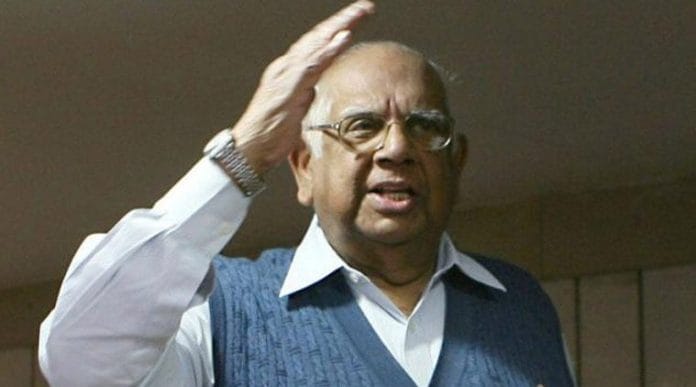The former Lok Sabha Speaker, who died Monday, was among the first in his party to support truck with the Congress to keep the BJP away.
New Delhi: When he chose not to resign as Lok Sabha Speaker after his party – the CPI(M) – withdrew support to the Congress-led UPA in 2008 over the Indo-US nuclear deal, Somnath Chatterjee was expelled on disciplinary grounds, just days before his 79th birthday.
This, however, wasn’t the first time Chatterjee had gone against the grain and rebelled.
The son of Nirmal Chandra Chatterjee, a Hindu nationalist who was once president of the All India Hindu Mahasabha, Chatterjee went against his family’s political tradition when he chose to become a Communist.
Also read: Former Lok Sabha speaker and CPI (M) veteran Somnath Chatterjee no more
Chatterjee, who died Monday at the age of 89, was a Lok Sabha member for nearly four decades, also serving as Speaker from 2004-2009. One of the longest serving parliamentarians, he was a member of the lower house from 1971 to 2009, losing just the 1984 election from Jadavpur constituency to a young Mamata Banerjee. Widely admired as a parliamentarian, he aptly chose to name his memoirs Keeping The Faith.
The CPI(M) today is but a pale shadow of itself, withering both electorally and politically – a sizeable blame for which goes to the party leadership’s complete lack of practicality and their inability to rise above dogma.
Chatterjee, though a Communist at heart, was different from the many theoreticians in his party. Much like former CPI(M) general secretary Harkishan Singh Surjeet, Chatterjee was a political pragmatist, willing to adapt to altered socio-political realities.
Like Surjeet, he believed in engaging with the Congress for the purpose of keeping the BJP out, incidentally, the line now pushed by current general secretary Sitaram Yechury as well. He was, to put it pithily, a pragmatist Communist – a phrase that many might view as an oxymoron – yet ideological in his own right.
His refusal to step down as Speaker following the 2008 trust vote, therefore, was a reflection of his political personality. He believed the Speaker’s post was above party lines. He also refused to vote against the Congress government at the time, claiming it would mean voting on the same side as the opposition BJP.
This was unacceptable to a party like the CPI(M), which believes in adhering to the party line come what may, and which famously gave up the historic chance to have a Communist PM when it prevented veteran leader Jyoti Basu from taking up the post in 1996.
Chatterjee, born in Assam’s Tezpur in 1929, went on to read law and joined the CPI(M) in 1968. The CPI(M) was more radical than the CPI when the Communist party split in 1964. The CPI was closer to the Congress – and even ended up supporting the Emergency. On the contrary, sharp anti-Congressism defined the CPI(M). However, as the BJP grew, a section in party recognised that the threat of Hindu communalism was greater than that posed by the Congress.
This required the CPI(M) to engage with not only a broad range of regional parties, but also the Congress. Surjeet was the primary architect of this line and Basu, Chatterjee’s original mentor, also understood this. Yechury then went on to pick this strand as well.
It is in this tradition within the CPI(M) that one has to place Chatterjee. A radical Communist, he began to believe Communists had become revisionists.
Also read: CPI(M) flirting with Hindutva in Kerala is proof of its downfall
When he felt the rising Hindutva forces were a greater threat to democracy, he shifted his political tactics to accommodate those who he considered rivals. This is what helps one understand why he was uncomfortable with Prakash Karat’s decision to break ties with the Congress on the issue of the Indo-US nuclear deal.
His discomfort with Karat’s radicalism and his belief that the Speaker needn’t follow any party’s diktat led him to take a firm stance.
In an interview last year, Chatterjee had categorically stated he could not become the President of the country when he was approached in 2007 because of Karat’s objection to his candidature. He, however, added his was a “small matter compared to Mr. Karat’s decision not to allow Jyoti Basu to become Prime Minister”.
Ten years later, however, he would have been relieved to see the more pragmatic line in a sharply divided party just managing to survive. Earlier this year, at its Hyderabad party congress, the CPI(M) adopted Yechury’s political line that allows some understanding with other secular, democratic forces like the Congress.
Chatterjee, who was conferred the ‘Outstanding Parliamentarian’ award in 1996, had served as the chairman and a member of several parliamentary standing committees.
His party may have asked him to leave, but Chatterjee never quite left the CPI(M) behind. In a chapter titled ‘Colleagues and Comrades’ in his memoirs, he credits his 38-year stint as MP to his party. “My election to the house has been primarily because of my party’s efforts and popularity,” he wrote.







A great loss to parliamentary democracy. Prof Somnath Chatterjee defined what a Speaker’s impartiality should be like. Also a man of courage, stood up to the apex court when it was a question of defending the supremacy of Parliament. Lal salaam …